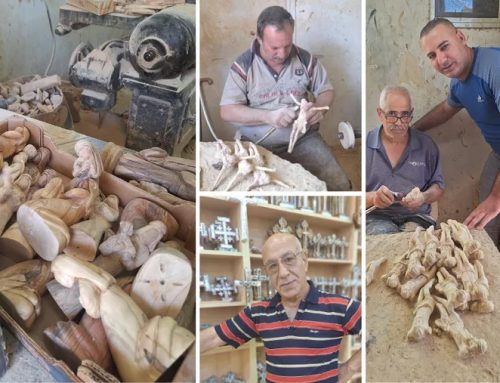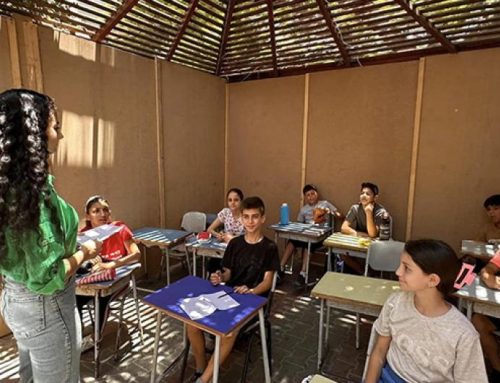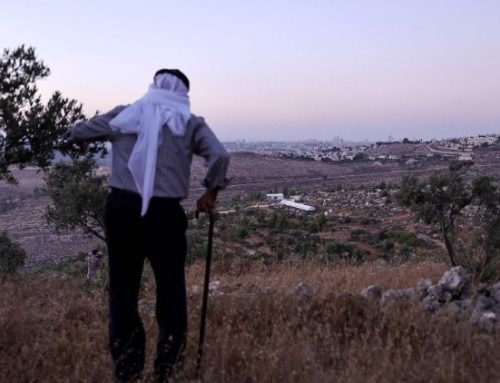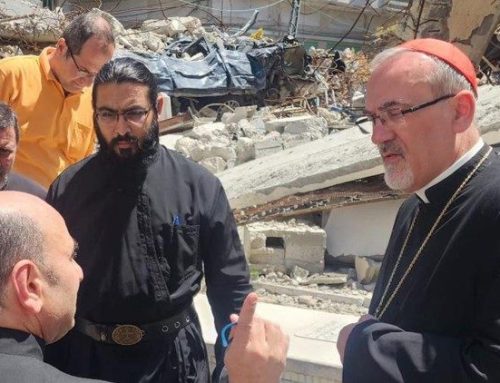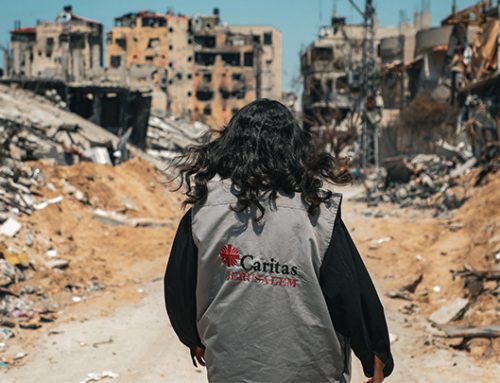Grace and salaam from Jerusalem and from the ELCJ. During this season of Pentecost we are asking God to bring us fresh winds of new life in the Holy Spirit for the people in this land. Many are struggling to recover from the recent Israeli military incursions into their towns and villages. Many people are fearful of new incursions, new methods and problems to make life even more difficult than it already is.
NEWSLETTER
from
Bishop Dr. Munib A. Younan,
Lutheran Bishop in Jerusalem of the
Evangelical Lutheran Church in Jerusalem,
serving in Palestine, Jordan and Israel
Dear Brothers and Sisters in Christ,
Grace and salaam from Jerusalem and from the ELCJ. During this season of Pentecost we are asking God to bring us fresh winds of new life in the Holy Spirit for the people in this land. Many are struggling to recover from the recent Israeli military incursions into their towns and villages. Many people are fearful of new incursions, new methods and problems to make life even more difficult than it already is.
But in the midst of incursions and fear, of poverty and destruction, there are signs of hope. Thanks be to God!
Worship at Christmas Lutheran Church in Bethlehem
On Sunday, May 12, 2002, the congregation of the Christmas Lutheran Church in Bethlehem held its first worship service since March 31, Easter Sunday. Rev. Dr. Mitri Raheb joyfully announced that the first hymn to be sung on May 12 was “Christ the Lord Has Risen Today”, echoing the last hymn which had been sung on March 31. Resurrection, new life emerging out of death, was the theme and emphasis of worship, and Rev. Raheb encouraged the congregation in their faith in the Risen Christ. He said this is a time to use our brains, to work politically, because so much damage has been done to the institutions of Palestine. He called for a commitment to continue the mission of the church.
Many special guests were present for the worship service, including Bishop Dr. Munib and Suad Younan, members of the bishop’s staff, the pastors of the English-speaking congregation in Jerusalem and people connected with that church. Also present as special guests were Jewish friends Rabbi Arik Ascherman, Rabbi Jeremy Milgrom and Ms Anat. Their presence was a sign of solidarity and hope for us, demonstrating that Israelis and Palestinians can live together. Our Jewish Israeli guests came to us willingly as neighbors, not as occupiers, wanting to be in solidarity because of what had happened to us. It was a very encouraging day for the members and friends of Christmas Lutheran Church.
The people of Bethlehem, Beit Sahour and Beit Jala had been under Israeli military siege and twenty-four hour curfew for forty days. Much damage had been done to the towns, especially in the Old City of Bethlehem where the Nativity Church is located, and also where Christmas Lutheran Church is located, at the other end of the marketplace. The Christmas Church sanctuary was spared, but the church compound was greatly damaged, including the International Christian Center, art workshops, classrooms, offices and fixtures intended for the building in the process of construction. One main, loadbearing column in a wall by the street had been nicked by a tank missle, and just that nick was enough to crack the column significantly.
“Christ the Lord Has Risen Today, Alleluia!” The alleluias rang out clearly and joyfully at Christmas Lutheran Church on Sunday, May 12.
COCOP Meetings and Visitations to ELCJ Churches
The Coordination Committee for Co-Operation between the ELCJ and her Overseas Partners (COCOP) held its annual meeting May 14-17. This was the first time the ELCJ itself had met together since January 18, 2002, due to the severe problems of checkpoints, roadblocks, incursions and curfews. COCOP partners with the ELCJ include church bodies and mission organizations in Germany, the USA, Norway, Sweden and Finland. Approximately thirty participants in the 2002 COCOP, including members and guests, worshipped together and held business meetings at Talitha Kumi School in Beit Jala, and made on site visits to five of the six ELCJ churches, hearing the pastor’s report at each site.
Tuesday, May 14, was a full day visit to Ramallah which only ten days earlier had been released from a twenty-three day siege involving a twenty-four hour curfew by the Israeli military forces. The COCOP visit included a tour of the extensively damaged Lutheran School of Hope, Rev. Ramez Ansara’s story of his personal experience with the soldiers in searching the church building, and a visit to the church parsonage which had been used and abused by a group of Israeli soldiers. Later in the day the group consulted with the Health, Development, Information and Policy Institute and visited the Al-Am’ari Refugee Camp in Ramallah. In the camp, which has about 7000 residents, the COCOP group saw several facilities for disabled children which receive financial assistance from the International Christian Committee-Middle East Council of Churches (ICC-MECC). The group was delighted to see a children’s drama group rehearsing a play. It is one of the important ways in which both children and adults overcome the trauma of occupation and find hope in a hopeless situation. The final visit of the day was with Palestinian Chairman Yasser Arafat who received the Lutheran group at his headquarters and spoke about the current situation for the Palestinian people.
On Wednesday, May 15, the COCOP met in session in the morning, hearing and responding to Bishop Younan’s 2001 report which described the ELCJ as a church in martyria. A discussion followed the bishop’s report which centered on the meaning of martyria in modern times. This martyria is not only death. The church’s suffering and existence in times of grave crisis is in itself a martyria, a witness. Discussion began and was concluded in the following days on the new COCOP constitution. On Wednesday afternoon the group visited two ELCJ churches.
In Beit Jala, Rev. Jadallah Shehadeh reported about the difficulties encountered during the recent siege and also spoke about the hopes he has for the construction and use of Abrahams Herberge (House). It is intended to be used as a reconciliation center, bringing Christians, Jews and Muslims together in a lovely retreat setting. Some of this reconciliation work has already begun, but there are plans to resume and enlarge the work if and when the conflict situation lessens. The group also toured the Lutheran Home for Boys on the church compound.
In Bethlehem, Rev. Dr. Mitri Raheb gave the COCOP group a tour of the damaged church compound, and also showed the group the new construction of an auditorium and rooftop restaurant on the church grounds. Rev. Raheb related his story of being held by Israeli soldiers as the compound was searched and damaged. He also spoke of the new
Dar al-Kalima Academy which will soon open and provide leadership training.
On Thursday and Friday, May 16-17, the COCOP met in session and heard various reports. Ms Violet Raheb, Director of the ELCJ Schools, spoke of the grave difficulties the schools are facing due to the Israeli military occupation and incursions. Most of the school families cannot pay their children’s tuition. Due to the critical economic situation facing Palestinians they probably will not be able to meet tuition payments for a year or more. Economic growth must occur before families will have the means to pay for their children’s education. Now is the time when the world community is asked to turn to the ELCJ and assist with the church’s strong educational mission which serves the whole Palestinian society. Ms Raheb expressed her regret that she will be obliged to leave her director position because Israel has denied her future husband a visa to stay or even visit in this land. Bishop Younan also expressed his regret at her resignation and departure, saying that this is yet another example of what many Palestinians experience.
The new constitution was finalized and signed. Bishop Younan stated that “COCOP has now moved from the COCOP of the 1970s into the 21st century by following modern mission theology. The local church now invites the overseas partners to be involved in its mission, rather than the other way around. The sense of equality between the ELCJ and its partners is being experienced more and more.” A special expression of gratitude was given to OKR Hannes Gaenssbauer, VELKD, who has served with COCOP for fifteen years. In that time he has served as the chairperson of COCOP. The ELCJ admires and respects his fresh model of the theology of mission.
Also on Thursday the COCOP group traveled to the Lutheran Church in Beit Sahour, hearing Evangelist Hani Odeh’s report, and learning about the situation for the church and the Lutheran school in Beit Sahour. Finishing the afternoon was a tour of the proposed housing site on the Mount of Olives. This project will be under the auspices of the ELCJ Lutheran Church of the Redeemer, Old City Jerusalem, and Rev. Ibrahim Azar gave his report during this time.
Rev. Samer Azar from the Evangelical Lutheran Church of the Good Shepherd in Amman, Jordan, was unable to attend the COCOP meetings because of political complications pertaining to West Bankers. We are remembering the Azar family in prayer as they minister faithfully among the people in Amman. A written report from Pastor Azar gave details about the Good Shepherd work and ministry.
After COCOP – Coming Down from the Mountain
We are reminded of Jesus’ transfiguration on the mountain (Matthew 17) but how it was necessary for Jesus and his disciples to come back down to the valley. Immediately they were confronted with a very sick child and a frantic father, seeking healing. The disciples felt helpless in the face of such a serious and recalcitrant illness, but Jesus healed the child, bringing joy to the father and amazement to the disciples.
The ELCJ is experiencing some of these same feelings as it returns to the work in the valley after the mountaintop COCOP experience. It was so good to worship and pray together, to share ideas and visions, to talk about the pain and difficulties and joys of ministry in this land. But now we must return to the valley where Palestinian people are continuing to suffer the damages of unemployment, ill health, broken homes and a fractured society. Our Lutheran schools, for example, are functioning and giving a place of safety and peace to our children, but most of the tuition fees cannot be paid by the families and the ELCJ has only a limited amount of money to contribute. How long can this go on? We do not know.
Of Governments, Fears, Peace and Steadfastness
At this moment we are seeing new Israeli incursions into Palestinian towns but the world does not seem to be watching. This morning, Monday, the Israeli army returned to Bethlehem, imposing another curfew. The army was also in Bethlehem Saturday evening, leaving early Sunday morning. We are seeing a Palestinian government that is discussing major and minor reforms. We are hearing various approaches to peace from around the world.
Every day we as the ELCJ are approached by our people who are unemployed asking for employment; who have no money and are asking for financial help, particularly in regard to daily life, to school tuition payments and university fees. Like the disciples, it is too much for us – we don’t know what to do. God instructs us to comfort his people, but with what? We give our love and our concern and what little we have, but we weep with our people because none of us has what is needed to give even partial satisfaction.
Can there be peace among the Palestinians and Israelis in this land? We do not know but we continue to hope. The extremist views of both sides are on the rise. Ideologies which we thought were buried in the Oslo agreement have now been rejuvenated. We are hearing once again about a “unilateral state,” from the Mediterranean Sea to the Jordan River, which can result in devastating possibilities.
1) Palestinian cities and towns may turn into “cantons” or “bantustaans” with no free access between them. A recent Israeli requirement is that West Bankers have a permit to move from town to town. The Gaza Strip has already been divided into three sections and travel between the sections is nearly impossible.
2) Palestinian people may be deported or “transferred” from their homeland. This can be a direct transfer, such as expulsion by the Israeli government, or it can be a more subtle transfer in which people “voluntarily” leave because life has been made unbearable by the Israeli military occupation and increasing harassment.
Perhaps these statements sound too strong, even paranoid. But we are now hearing them voiced publicly, in the press and in conversation. As can be imagined, these public words and ideas are very frightening to Palestinian people and are causing the gap of mistrust between Palestinians and Israelis to widen even further. But Palestinian people are much more aware of their fate than they were in 1948 and 1967. Now, in 2002, they are not ready to flee to escape the Israeli threats and incursions. Rather, the people are determined to remain steadfast in the land. The only solution for the State of Israel is to accept a State of Palestine within the 1967 boundaries. Only in this way will Israelis and Palestinians have security and freedom. This will change the Middle East to become a just, peaceful area on the face of this earth.
Thank You for Your Love and Support
We ask you to continuing praying for us. We are thankful for your letters and expressions of encouragement and are sorry we cannot answer every one of them. We appreciate your interest and concern and are sure you will understand that we are working each day in a crisis management situation.
Every day we thank God for your support and solidarity with us as Christian Palestinians in the Lutheran church. We may feel helpless and not know answers, but we do know that Christ is present with us, with his power to heal even the worst illnesses and situations, and with the fresh, strong winds of God’s Holy Spirit.
Noted by Rev. Dr. Mary E. Jensen
Communications Assistant to Bishop Younan and the ELCJ
———————————————————————————————————————————————-
P.O.Box 14076, JERUSALEM 91140
Tel: 00972 – 2 – 6276111; 6285764; E-mail: ga_elcj@netvision.net.il
Website: www.holyland-lutherans.org

